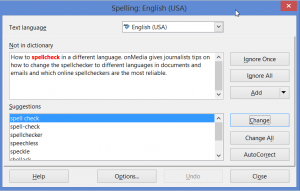How to spell check in different languages

As an editor, I am surprised at how often reporters send me articles that they obviously haven’t run through a spell checker beforehand. And it’s usually journalists who work in a language other than English who fail to spell check – even though they might need all the English spelling help they can get.
With so many free tools and dictionaries available online, there is really no excuse. A reporter’s job is all about getting the facts correct. And if you send off an article, script or even an email full of spelling mistakes to your editor, how can they trust you to get the other facts right?
onMedia offers some tips on how to change the spell checker to different languages in documents and emails and which online spell-checkers are the most reliable.
Here’s a quick list of resources.
Free online spell checkers
There are many online spell checkers, but unfortunately not all of them are that good. Many of them only allow you to paste in a certain number of characters, which is really annoying. And others flag relatively new words such as ‘online’ and ‘blog’ as errors. This isn’t particularly useful if you write about a field where the vocabulary is regularly expanding.
My personal favorite is spellchecker.net as it has a wide layout and also highlights misspelled words, making it easier to use than many other online sites. You can select from hundreds of languages.
Spellboy.com is also easy to use and allows you to chose between UK and US English.
Using inbuilt spell checkers in word processing software
- OpenOffice (PC) and NeoOffice (Mac). This free office software has a long list of foreign-language dictionaries available online without charge. They are easy to install (I know, because this is what I use). Here are step-by-step instructions on how to do this for OpenOffice and NeoOffice.
- Microsoft Office. To spell-check in another language in Microsoft Office, your copy of the software must include a dictionary file of the desired language. You can see here what languages come with your version, and how to install new languages and change language setting here.
- Mac. See here for how to add dictionaries and change language settings.
Spell checking emails
- Gmail. Gmail does come with an inbuilt spell checker but it will only check in the language you’ve selected to display your email account in, making it difficult to swap backwards and forwards between different languages. For example, if your account is set up in Arabic, it will only spell check Arabic and if you want to quickly check an email in English, you have to completely change all the settings. In this case, it’s easier just to copy and paste your email text into an online spellchecker.
- Yahoo Mail. It’s easy to change between various languages – here’s how.
- Mozilla Thunderbird. You can add as many dictionaries as you like so you can easily spell check different languages. Find out more here. You can also set Thunderbird to automatically run the spell check before you send an email, which can save you from embarrassing spelling mistakes.
What to do when the spellchecker can’t help
I am Australian and write for both American and English media outlets – so at times I get confused about how I should spell a word for a particular client. Other times, the word is relatively new and I’m just not sure what’s more common – is ‘spell-checker’, ‘spellchecker’ or ‘spell checker’ correct, for example?
In these cases, I look up the expression in the Merriam Webster dictionary. I also paste the term into the New York Times newspaper site and see how they write the word. For English spelling, I type it into the Guardian.
Check and check again!
Be aware though, that a spell checker still won’t pick up the difference between ‘I’ve just read you’re email’ and ‘I’ve just read your email’ or ‘it’s warm today’ and ‘its warm today’ so it’s important to read everything one last time before you send it off.
Not only will you look more professional and trustworthy, your editor will love you!
Also take a look at these onMedia links
Journalists need to get better at spelling names
Tips to ensure effective and clear online writing
Written by Kate Hairsine



